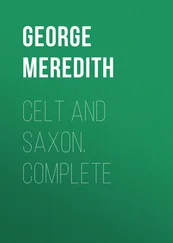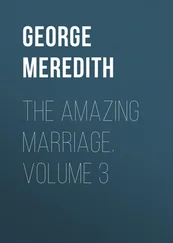George Meredith - The Amazing Marriage. Complete
Здесь есть возможность читать онлайн «George Meredith - The Amazing Marriage. Complete» — ознакомительный отрывок электронной книги совершенно бесплатно, а после прочтения отрывка купить полную версию. В некоторых случаях можно слушать аудио, скачать через торрент в формате fb2 и присутствует краткое содержание. Жанр: foreign_prose, literature_19, foreign_antique, на английском языке. Описание произведения, (предисловие) а так же отзывы посетителей доступны на портале библиотеки ЛибКат.
- Название:The Amazing Marriage. Complete
- Автор:
- Жанр:
- Год:неизвестен
- ISBN:нет данных
- Рейтинг книги:3 / 5. Голосов: 1
-
Избранное:Добавить в избранное
- Отзывы:
-
Ваша оценка:
- 60
- 1
- 2
- 3
- 4
- 5
The Amazing Marriage. Complete: краткое содержание, описание и аннотация
Предлагаем к чтению аннотацию, описание, краткое содержание или предисловие (зависит от того, что написал сам автор книги «The Amazing Marriage. Complete»). Если вы не нашли необходимую информацию о книге — напишите в комментариях, мы постараемся отыскать её.
The Amazing Marriage. Complete — читать онлайн ознакомительный отрывок
Ниже представлен текст книги, разбитый по страницам. Система сохранения места последней прочитанной страницы, позволяет с удобством читать онлайн бесплатно книгу «The Amazing Marriage. Complete», без необходимости каждый раз заново искать на чём Вы остановились. Поставьте закладку, и сможете в любой момент перейти на страницу, на которой закончили чтение.
Интервал:
Закладка:
Lord Fleetwood led an easy dialogue with him and Sir Meeson, on their different themes immediately, which was not less impressive to an observer. He listened to Sir Meeson’s entreaties that he should start at once for Baden, and appeared to pity the poor gentleman, condemned by his office to hang about him in terror of his liege lady’s displeasure. Presently, near the close of the meal, drawing a ring from his finger, he handed it to the baronet, and said, ‘Give her that. She knows I shall follow that.’ He added to himself:—I shall have ill-luck till I have it back! and he asked Woodseer whether he put faith in the virtue of talismans.
‘I have never possessed one,’ said Woodseer, with his natural frankness. ‘It would have gone long before this for a night’s lodging.’
Sir Meeson heard him, and instantly urged Lord Fleetwood not to think of dismissing his man Francis. ‘I beg it, Fleetwood! I beg you to take the man. Her ladyship will receive me badly, ring or no ring, if she hears of your being left alone. I really can’t present myself. I shall not go, not go. I say no.’
‘Stay, then,’ said Fleetwood.
He turned to Woodseer with an air of deference, and requested the privilege of glancing at his notebook again, and scanned it closely at one of the pages. ‘I believe it true,’ he cried; ‘I had a half recollection of it—I have had some such thought, but never could put it in words. You have thought deeply.’
‘That is only a surface thought, or common reflection,’ said Woodseer.
Sir Meeson stared at them in turn. Judging by their talk and the effect produced on the earl, he took Woodseer for a sort of conjuror.
It was his duty to utter a warning.
He drew Fleetwood aside. A word was whispered, and they broke asunder with a snap. Francis was called. His master gave him his keys, and despatched him into the town to purchase a knapsack or bag for the outfit of a jolly beggar. The prospect delighted Lord Fleetwood. He sang notes from the deep chest, flaunting like an opera brigand, and contemplating his wretched satellite’s indecision with brimming amusement.
‘Remember, we fight for our money. I carry mine,’ he said to Woodseer.
‘Wouldn’t it be expedient, Fleetwood…’ Sir Meeson suggested a treasurer in the person of himself.
‘Not a florin, Corby! I should find it all gambled away at Baden.’
‘But I am not Abrane, I’m not Abrane! I never play, I have no mania, none. It would be prudent, Fleetwood.’
‘The slightest bulging of a pocket would show on you, Corby; and they would be at you, they would fall on you and pluck you to have another fling. I ‘d rather my money should go to a knight of the road than feed that dragon’s jaw. A highwayman seems an honest fellow compared with your honourable corporation of fly-catchers. I could surrender to him with some satisfaction after a trial of the better man. I ‘ve tried these tables, and couldn’t stir a pulse. Have you?’
It had to be explained to Woodseer what was meant by trying the tables. ‘Not I,’ said he, in strong contempt of the queer allurement.
Lord Fleetwood studied him half a minute, as if measuring and discarding a suspicion of the young philosopher’s possible weakness under temptation.
Sir Meeson Corby accompanied the oddly assorted couple through the town and a short way along the road to the mountain, for the sake of quieting his conscience upon the subject of his leaving them together. He could not have sat down a second time at a table with those hands. He said it:—he could not have done the thing. So the best he could do was to let them go. Like many of his class, he had a mind open to the effect of striking contrasts, and the spectacle of the wealthiest nobleman in Great Britain tramping the road, pack on back, with a young nobody for his comrade, a total stranger, who might be a cut-throat, and was avowedly next to a mendicant, charged him with quantities of interjectory matter, that he caught himself firing to the foreign people on the highway. Hundreds of thousands a year, and tramping it like a pedlar, with a beggar for his friend! He would have given something to have an English ear near him as he watched them rounding under the mountain they were about to climb.
CHAPTER IX. CONCERNING THE BLACK GODDESS FORTUNE AND THE WORSHIP OF HER, TOGETHER WITH AN INTRODUCTION OF SOME OF HER VOTARIES
In those early days of Fortune’s pregnant alternations of colour between the Red and the Black, exhibited publicly, as it were a petroleum spring of the ebony-fiery lake below, Black-Forest Baden was the sprightliest’ of the ante-chambers of Hades. Thither in the ripeness of the year trooped the devotees of the sable goddess to perform sacrifice; and annually among them the beautiful Livia, the Countess of Fleetwood; for nowhere else had she sensation of the perfect repose which is rocked to a slumber by gales.
She was not of the creatures who are excited by an atmosphere of excitement; she took it as the nymph of the stream her native wave, and swam on the flood with expansive languor, happy to have the master passions about her; one or two of which her dainty hand caressed, fearless of a sting; the lady petted them as her swans. It surprised her to a gentle contempt of men and women, that they should be ruffled either by love or play. A withholding from the scene will naturally arouse disturbing wishes; but to be present lulls; for then we live, we are in our element. And who could expect, what sane person can desire, perpetual good luck? Fortune, the goddess, and young Love, too, are divine in their mutability: and Fortune would resemble a humdrum housewife, Love a droning husband, if constancy were practised by them. Observe the staggering and plunging of the blindfold wretch seeking to be persuaded of their faithfulness.
She could make for herself a quiet centre in the heart of the whirlwind, but the whirlwind was required. The clustered lights at the corner of the vale under forest hills, the burst of music, the blazing windows of the saloons of the Furies, and the gamblers advancing and retreating, with their totally opposite views of consequences, and fashions of wearing or tearing the mask; and closer, the figures shifting up and down the promenade, known and unknown faces, and the histories half known, half woven, weaving fast, which flew their threads to provoke speculation; pleasantly embraced and diverted the cool-blooded lady surrounded by her courtiers, who could upon occasion supply the luminous clue or anecdote. She had an intuitive liveliness to detect interchanges of eyes, the shuttle of intrigue; the mild hypocrisy, the clever audacity, the suspicion confirmed, the complication threatening to become resonant and terrible; and the old crossing the young and the young outwitting the old, wiles of fair traitors and dark, knaves of all suits of the pack. A more intimate acquaintance with their lineaments inspired a regard for them, such as poets may feign the throned high moon to entertain for objects causing her rays to flash.
The simple fools, performing in character, were a neutral people, grotesques and arabesques wreathed about the margins of the scene. Venus or Fortune smote them to a relievo distinguishing one from another. Here, however, as elsewhere, the core of interest was with the serious population, the lovers and the players in earnest, who stood round the furnace and pitched themselves into it, not always under a miscalculation of their chances of emerging transfigured instead of serving for fuel. These, the tragical children of folly, were astute: they played with lightning, and they knew the conditions of the game; victories were to be had.
The ulterior conditions of the game, the price paid for a victory, they thought little of: for they were feverish worshippers of the phantasmal deity called the Present; a god reigning over the Past, appreciable only in the Future; whose whiff of actual being is composed of the embryo idea of the union of these two periods. Still he is occasionally a benevolent god to the appetites; which have but to be continuous to establish him in permanence; and as nothing in us more readily supposes perpetuity than the appetite rushing to destroy itself, the rational nature of the most universal worship on earth is perceived at once.
Читать дальшеИнтервал:
Закладка:
Похожие книги на «The Amazing Marriage. Complete»
Представляем Вашему вниманию похожие книги на «The Amazing Marriage. Complete» списком для выбора. Мы отобрали схожую по названию и смыслу литературу в надежде предоставить читателям больше вариантов отыскать новые, интересные, ещё непрочитанные произведения.
Обсуждение, отзывы о книге «The Amazing Marriage. Complete» и просто собственные мнения читателей. Оставьте ваши комментарии, напишите, что Вы думаете о произведении, его смысле или главных героях. Укажите что конкретно понравилось, а что нет, и почему Вы так считаете.












